Search the Special Collections and Archives Portal
Search Results

Rebuilding of Spotlight Lounge at new address, 975 East Sahara Avenue in Commercial Center, Las Vegas, Nevada: digital image
Date
2012-07-26
Archival Collection
Description
From the Dennis McBride Photograph Collection (PH-00263) -- LGBTQ+ events and organizations in Las Vegas, Nevada -- Digital images file. Notes from the donor, Dennis McBride: The Spotlight Lounge opened in April 1998, then was sold in 2011. There followed a major rebuilding of the bar, which reopened in 2012. The address was changed from 957 to 975 East Sahara Avenue.
Image
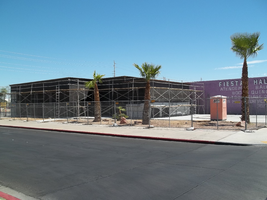
Rebuilding of Spotlight Lounge at new address, 975 East Sahara Avenue in Commercial Center, Las Vegas, Nevada: digital image
Date
2012-07-26
Archival Collection
Description
From the Dennis McBride Photograph Collection (PH-00263) -- LGBTQ+ events and organizations in Las Vegas, Nevada -- Digital images file. Notes from the donor, Dennis McBride: The Spotlight Lounge opened in April 1998, then was sold in 2011. There followed a major rebuilding of the bar, which reopened in 2012. The address was changed from 957 to 975 East Sahara Avenue.
Image
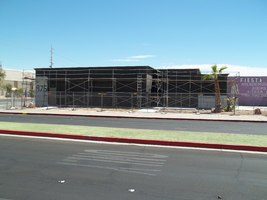
Rebuilding of Spotlight Lounge at new address, 975 East Sahara Avenue in Commercial Center, Las Vegas, Nevada: digital image
Date
2012-07-26
Archival Collection
Description
From the Dennis McBride Photograph Collection (PH-00263) -- LGBTQ+ events and organizations in Las Vegas, Nevada -- Digital images file. Notes from the donor, Dennis McBride: The Spotlight Lounge opened in April 1998, then was sold in 2011. There followed a major rebuilding of the bar, which reopened in 2012. The address was changed from 957 to 975 East Sahara Avenue.
Image
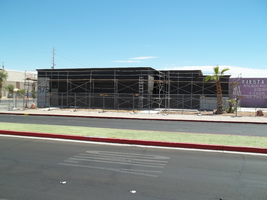
Rebuilding of Spotlight Lounge at new address, 975 East Sahara Avenue in Commercial Center, Las Vegas, Nevada: digital image
Date
2012-07-26
Archival Collection
Description
From the Dennis McBride Photograph Collection (PH-00263) -- LGBTQ+ events and organizations in Las Vegas, Nevada -- Digital images file. Notes from the donor, Dennis McBride: The Spotlight Lounge opened in April 1998, then was sold in 2011. There followed a major rebuilding of the bar, which reopened in 2012. The address was changed from 957 to 975 East Sahara Avenue.
Image
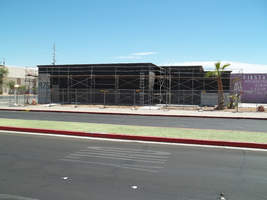
Rebuilding of Spotlight Lounge at new address, 975 East Sahara Avenue in Commercial Center, Las Vegas, Nevada: digital image
Date
2012-07-26
Archival Collection
Description
From the Dennis McBride Photograph Collection (PH-00263) -- LGBTQ+ events and organizations in Las Vegas, Nevada -- Digital images file. Notes from the donor, Dennis McBride: The Spotlight Lounge opened in April 1998, then was sold in 2011. There followed a major rebuilding of the bar, which reopened in 2012. The address was changed from 957 to 975 East Sahara Avenue.
Image
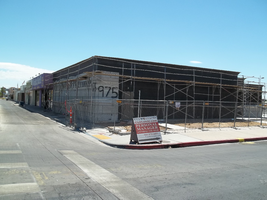
Rebuilding of Spotlight Lounge at new address, 975 East Sahara Avenue in Commercial Center, Las Vegas, Nevada: digital image
Date
2012-07-26
Archival Collection
Description
From the Dennis McBride Photograph Collection (PH-00263) -- LGBTQ+ events and organizations in Las Vegas, Nevada -- Digital images file. Notes from the donor, Dennis McBride: The Spotlight Lounge opened in April 1998, then was sold in 2011. There followed a major rebuilding of the bar, which reopened in 2012. The address was changed from 957 to 975 East Sahara Avenue.
Image
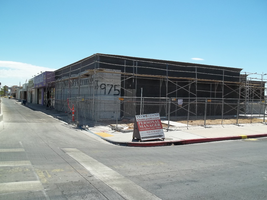
Rebuilding of Spotlight Lounge at new address, 975 East Sahara Avenue in Commercial Center, Las Vegas, Nevada: digital image
Date
2012-07-26
Archival Collection
Description
From the Dennis McBride Photograph Collection (PH-00263) -- LGBTQ+ events and organizations in Las Vegas, Nevada -- Digital images file. Notes from the donor, Dennis McBride: The Spotlight Lounge opened in April 1998, then was sold in 2011. There followed a major rebuilding of the bar, which reopened in 2012. The address was changed from 957 to 975 East Sahara Avenue.
Image
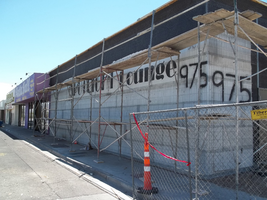
Rebuilding of Spotlight Lounge at new address, 975 East Sahara Avenue in Commercial Center, Las Vegas, Nevada: digital image
Date
2012-07-26
Archival Collection
Description
From the Dennis McBride Photograph Collection (PH-00263) -- LGBTQ+ events and organizations in Las Vegas, Nevada -- Digital images file. Notes from the donor, Dennis McBride: The Spotlight Lounge opened in April 1998, then was sold in 2011. There followed a major rebuilding of the bar, which reopened in 2012. The address was changed from 957 to 975 East Sahara Avenue.
Image
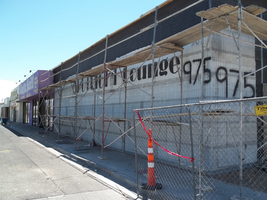
Rebuilding of Spotlight Lounge at new address, 975 East Sahara Avenue in Commercial Center, Las Vegas, Nevada: digital image
Date
2012-07-26
Archival Collection
Description
From the Dennis McBride Photograph Collection (PH-00263) -- LGBTQ+ events and organizations in Las Vegas, Nevada -- Digital images file. Notes from the donor, Dennis McBride: The Spotlight Lounge opened in April 1998, then was sold in 2011. There followed a major rebuilding of the bar, which reopened in 2012. The address was changed from 957 to 975 East Sahara Avenue.
Image
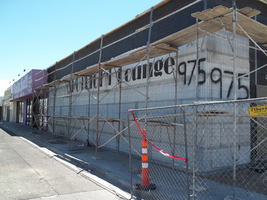
Rebuilding of Spotlight Lounge at new address, 975 East Sahara Avenue in Commercial Center, Las Vegas, Nevada: digital image
Date
2012-07-26
Archival Collection
Description
From the Dennis McBride Photograph Collection (PH-00263) -- LGBTQ+ events and organizations in Las Vegas, Nevada -- Digital images file. Notes from the donor, Dennis McBride: The Spotlight Lounge opened in April 1998, then was sold in 2011. There followed a major rebuilding of the bar, which reopened in 2012. The address was changed from 957 to 975 East Sahara Avenue.
Image
Pagination
Refine my results
Content Type
Creator or Contributor
Subject
Archival Collection
Digital Project
Resource Type
Year
Material Type
Place
Language
Records Classification
